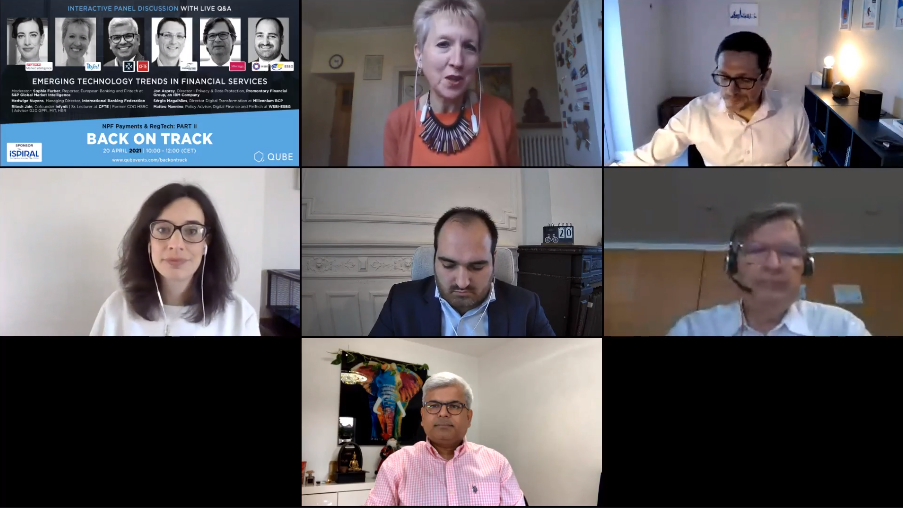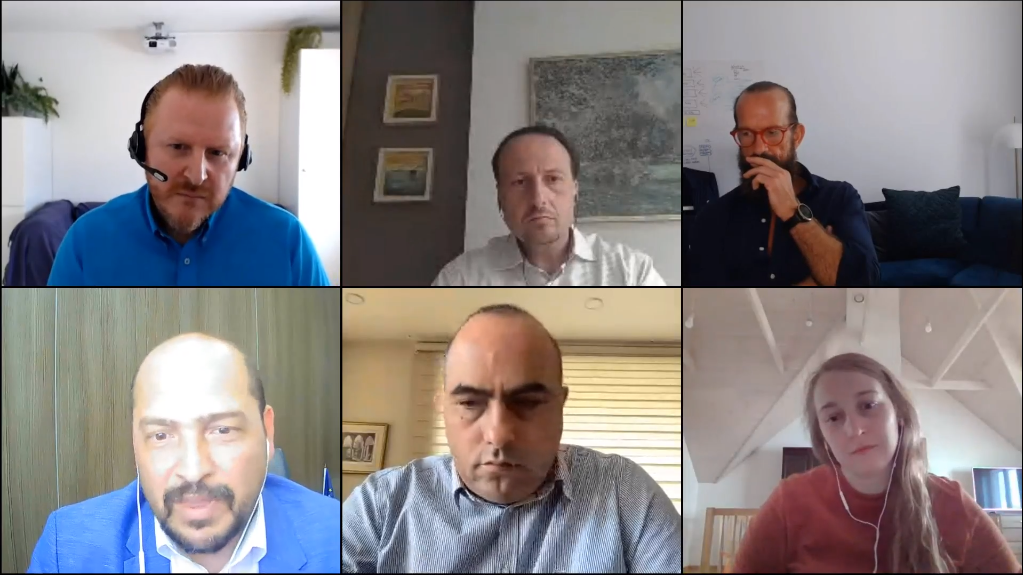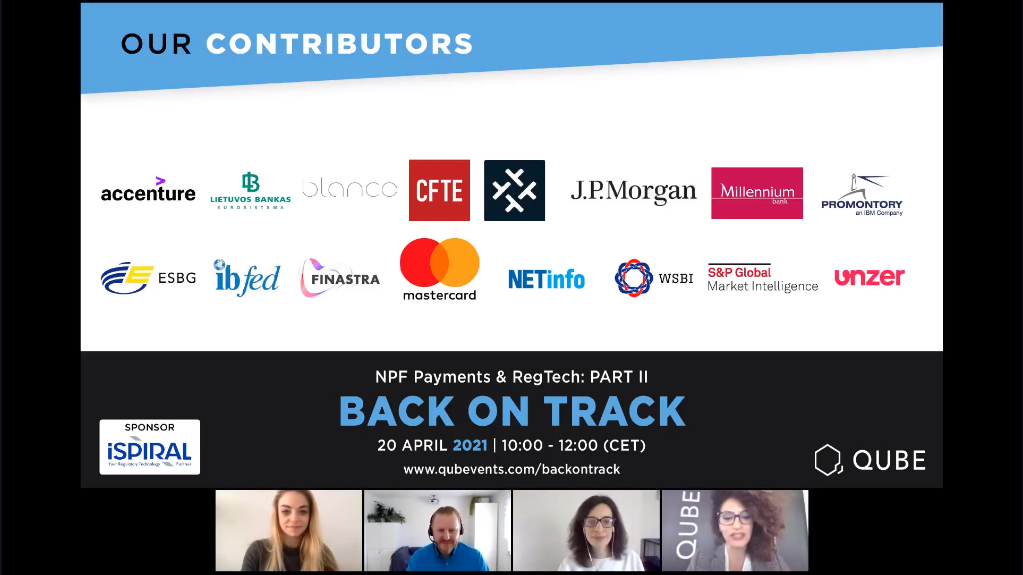- NPF Payments and RegTech Webinar Part II: Back on Track took place.
- Once again, Qube Events gathered an impressive list of speakers from FinTech and RegTech.
- Everybody involved did a fantastic job to make the event ultimately informative, but given how little time there was, it raised even more questions.
- A lot of ideas for future Qube events were voiced.
On April 20, 2021, Qube Events conducted Part II of their NPF Payments and RegTech Webinar. The theme of Part II was ‘Back on Track.’ Expert speakers were given an opportunity to talk about how payments have changed in the course of the recent COVID-19 crisis and what industries may or should do about it. An ITKeyMedia correspondent got the chance to attend.
The webinar was scheduled for only two hours. Obviously, it is too little time to cover such a vast and multi-angled topic. So, without further ado, after brief welcoming addresses from Qube representatives Lilly Pavlou and Marta Baranowska and moderators Sophia Furber and Koen Vanderhoydonk, the event moved on to outlining the existing trends in global payments.
Global Payment Trends According to Accenture

Sulabh Agarwal, Managing Director at Accenture
Accenture‘s managing director Sulabh Agarwal outlined global payment trends the way they are seen by his company. These trends are:
- New forms of currency. Most recently, the rising interest of national regulators to crypto currency and the plans on launching a number of national CBDCs in various countries.
- Faster and better rails. Further introduction and integration of new technologies that make payments both faster and more secure.
- The great COVID-19 acceleration. Users prefer not to use neither cash, nor physical plastic. Payments need to be contactless.
- Trust – The stakes are getting higher. The rise of contactless payments leaves more room for new kinds of fraud. Aside from confronting these risks, providers need to make the clients feel like they can trust the providers.
- Activist regulators. National and international regulators assess the new situation and confront the coming challenges in a proactive yet unpredictable way.
- Every company is a fintech company. Rather than using third-party fintech providers, a lot of bigger companies launch their own fintech services.
- Enabling the next billion users. The emerging markets outside the ‘First World’ are becoming increasingly attractive.
- Payments my way. There is a doubt about whether legacy players can retain their dominance over the market or the horizon will change fundamentally.
Further on Trends: Emerging Trends in Financial Services
The following panel discussion had a similar topic: Emerging Trends in Financial Services. So, Mr Agarwal’s list of global payment trends provided an excellent framework for the discussion. The participants were International Banking Federation‘s managing director Hedwige Nuyens, Infynit‘s co-founder and CFTE‘s senior lecturer Ritesh Jain, IBM’s Promontory Financial Group‘s director of privacy and data protection Jon Asprey, Millennium BCP‘s director of digital transformation Sergio Magalhaes, and WSBI-ESBG‘s policy adviser in digital finance and FinTech Matteo Mannino. The moderator was Sophia Furber, S&P Global Market Intelligence‘s European banking and FitTech reporter.

NPF Payments and RegTech Webinar First Panel Discussion: Emerging Trends in Financial Services
Ms Nuyens pointed out that the payment processes can now include more data and thus be enhanced. This is particularly necessary because, for example, cryptocurrencies lack security, which can be remedied by adding more data. But on a more existential point, she voiced a question – what would be the role of traditional banks, including central banks, when all payments become contactless and the use of cash steadily declines?
According to Mr Jain, as cryptocurrencies have become popular as a means for storing value, one can click here for an example of how cryptocurrency is used in this way. While limited as a transactional currency for goods and services, this value is more appealing to opportunists and investors, encouraging them to build a crypto mining rig in order to earn more blockchain rewards. While this is still a landmark in smart technology, Mr Jain points out that it is yet another reason why it is so important to pass appropriate legislation to keep it regulated. To this Ms Nuyens reminded that China, for one, already has a government-issued CBDC that is more secure than Bitcoin and other decentralized cryptocurrencies.

Jon Asprey, Director of Privacy & Data Protection at Promontory Financial Group, an IBM Company
Mr Asprey mentioned that there is an overall need of a comprehensive GDPR-style regulatory act to facilitate data security on every level of the ecosystem. The existing PSD2 already involves a lot of data sharing between different levels, but the policy itself acts locally and doesn’t cover the entire flow of data.
Mr Mannino, whom other participants unanimously recognized as the most well-informed expert on regulations, continued that the European Commission is expected to announce a regulatory framework for digital identity at the end of May. According to him, banks will play their role in the cross-sectoral process of forming people’s digital IDs. However, more harmonization is required both between levels and between countries so that people could make full use of their digital IDs.
At this point, Mr Jain raised concern about the ownership of those IDs. ‘Do you own your identity? Should the banks own it? Should it be created by the user or distributed by the banks?’ Yet more questions to be answered. To this, Ms Nuyens insisted that anonymity enables fraud and identification is necessary anyway. Moreover, she reminded that social media like Facebook already identify people, so it’s not even so much of an innovation.

Sergio Magalhaes, Director of Digital Transformation at Millennium BCP
Mr Magalhaes recalled Mr Agarwal’s thesis from the previous section that trust issue is among the most important trends in global payments. Therefore, comprehensive data protection policies are necessary in regard to the suggested digital IDs because it’s essential that people trust providers with their data. Here, Mr Asprey remarked that it’s also necessary not to put off the users by asking too much data from them.
To finalize the section, Mr Magalhaes concluded: ‘I really believe that the financial future will be driven by digital identities. With COVID, the customer behavior likely changed forever. Digital identity verification will be essential to improving the remote onboarding experience. At the same time, it can minimize the threat of fraud and account takeover attacks.’
Inspirational Session from Mastercard’s Michael Clark

Michael Clark, VP at Mastercard Data & Services
Next on schedule was Mastercard vice-president Michael Clark‘s inspirational session with the topic Navigating Your Digital Future in Banking and Beyond. Given how little time the speakers were assigned, he went straight to the point and began with pointing out the widespread of APIs that few people notice. Naturally, this trend is also in full effect in neobanking that is powered by scalability and flexibility that APIs have to offer. APIs are the key regardless of whether open banking is regulatory-driven or industry-driven on a particular market. Moreover, according to him, digital capabilities accelerated during the pandemic, showing the rise that was planned for five years in only one year.
As for the way organizations may choose to employ it, Mr Clark points out two possible models. Some choose to own the entire journey, while others participate in other organizations’ journeys, thus unlocking new customers. They all have to use API and treat it as a product in itself.
Mr Clark’s inspirational conclusion was a call for all organizations to make APIs for all their services, especially the news services or products as they arise. This is a sure way to leverage the power of one’s brand and make the best of the trust that people have in brands.
iSpiral – a Unique Data-Driven Risk Assessment Solution

Christos Ttiniozou, Managing Director at iSpiral
The next section was a sponsor session by Christos Ttiniozou, managing director at iSpiral, who took a few minutes to present his company. ISpiral is a RegTech company that offers risk evaluation services to banks and FinTech companies. Mr Ttiniozou explained that this process involves the following challenges:
- Complexity of onboarding for legal entities, funds, and individuals;
- Digital identification to verify the person’s identity;
- AML screening and onboarding monitoring to identify people who are under sanctions or are associated with someone who is under sanctions, and minimize false positives;
- Ongoing risk assessment;
- Regulatory reporting, generating and presenting reports in the correct form to correct addresses;
- Transaction monitoring to eliminate money laundering, tax evasion, and other fraud.
Most organizations are still using the classic approach to tackle these challenges. This involves a group of experts investigating each case individually. Naturally, it requires a lot of time and effort. ISpiral, on the other hand, promotes a data-driven approach that allows to assess a client in milliseconds. In addition, should there be any doubt, such a case can be sent to manual approval.
How the Pandemic Changed the Payment Operating Model
The final part was another panel discussion on Rethinking the Payment Operating Model. Mr Ttiniozou stayed to speak at the panel, joined by Bank of Lithuania‘s director of financial services Ruta Merkeviciute, Nordastra‘s head of payments Anders Olofsson, Unzer‘s head of business development Panagiotis Kriaris, and NETinfo‘s chief business development officer Polys Hadjikyriakos. Unfortunately, another scheduled speaker, JPMorgan‘s head of CEEMEA product management Virginie Dhouibi, could not join the panel for technical reasons. Blanco‘s CEO BeLux and a well-known speaker himself Koen Vanderhoydonk moderated the discussion.

NPF Payments and RegTech Webinar Second Panel Discussion: Rethinking the Payment Operating Model
Mr Kriaris disagreed that COVID changed the way payments worked as much as some other speakers may picture it. He insists that a lot of changes were in place before the pandemic. What happened is that in course of the lockdown banks changed their policies to allow clients more access to their funds without having to attend the bank offices. Another thing he pointed out is the shrinking of the generation gap within the clientele. Today, clients’ needs and requirements don’t depend on their age as much as they used to, which is a positive thing because, for example, it allows more institutions to use APIs and have more people become part of their eco systems.
Mr Olaffson suggested a quote to elaborate upon: ‘Everybody wants banking, but nobody wants banks.’ He suggested that today, with increased transparency and press scrutiny, all companies need to pay more attention to their ‘visionary narrative’ that would serve as a leitmotif to all company’s activities.

Ruta Merkeviciute, Director of Financial Services at Bank of Lithuania
According to Ms Merkeviciute, the main thing that changed is how both companies and clients view product. It used to be an independent thing in itself, but today all products are a part of a complex customer journey. Companies have to enter into collaborations to create these customer journeys. Regulations are also a part of a customer journey, even though the customer may not know or care about them. That’s why, Ms Merkeviciute concludes, there is an expressed need for APIs that would make the supervision process seamless for the client and less costly for banks. Continuing this thought, the moderator Mr Vanderhoydonk coined the term ‘SupTech’ – supervision technology that supplements RegTech.
‘If we don’t transform, we will cease to exist,’ proclaimed Mr Olafsson. According to him, companies like Nordastra work with larger banks and have a possibility to preserve like this for some time. But eventually the customer base will simply die out and banks will cease to exist, unless all players on the market embrace BaaS and big customer journeys created by many companies in cooperation.
When asked to conclude the discussion, Ms Merkeviciute said that companies in this field need to stop asking customers what they want. Instead, they should analyze the data that they have and thus find out what customers want. Mr Olafsson finalized the panel with a call: ‘Define your core capabilities and ensure you’re solving consumers’ problems.’

NPF Payments and RegTech Webinar Part II: Back on Track contributing companies
‘Amazing’ was the most repeated word as the moderators and Qube representatives were summing up the event. For Mr Vanderhoydonk, it was particularly amazing to get a helicopter view of the niche. And Ms Furber listed a whole array of questions that the discussions raised – from the concrete ‘Can we be sure that customers get treated fairly?’ to the existential ‘What are the banks for in today’s world?’
It is no wonder that more questions could be asked than answered in such little time. However, these questions were not just pronounced. They were passed on to Qube Events to lay the framework for further events. We can’t wait for Qube’s further webinars!

Kostiantyn is a freelance writer from Crimea but based in Lviv. He loves writing about IT and high tech because those topics are always upbeat and he’s an inherent optimist!





